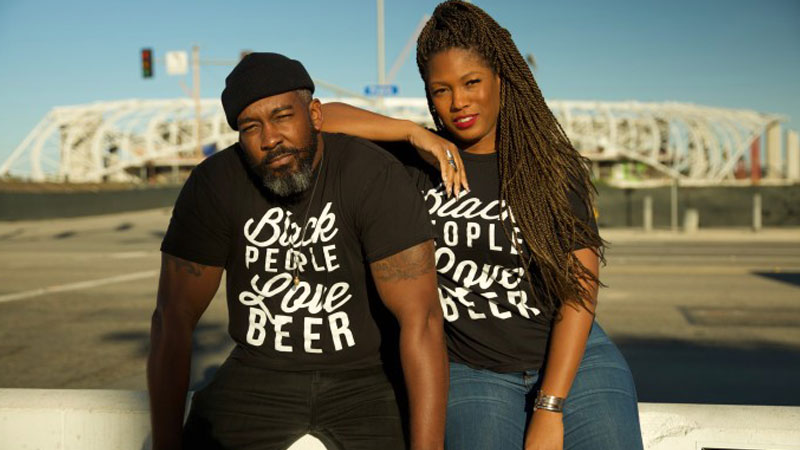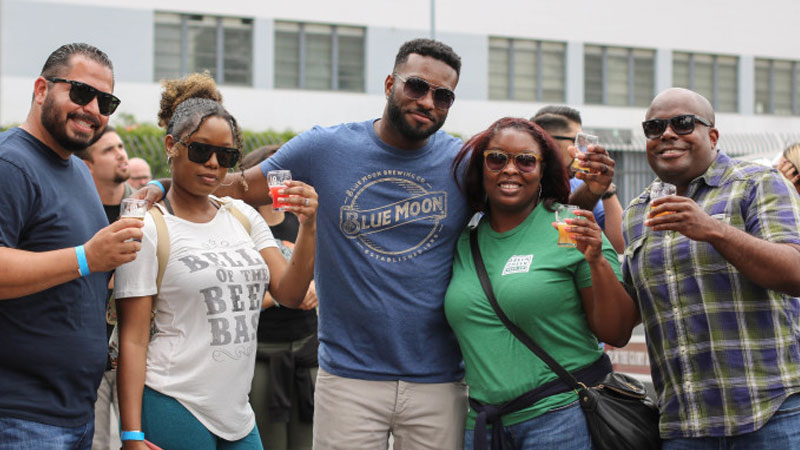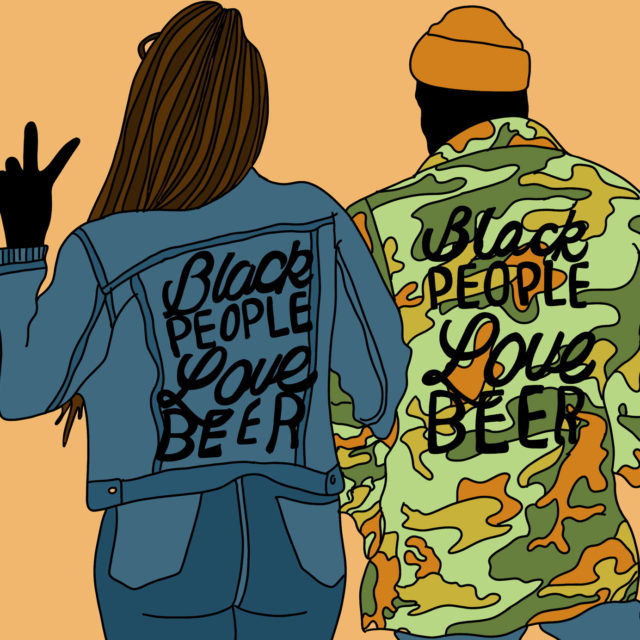“It’s like the glitch-in-the-Matrix feeling. You know something’s wrong, but you can’t put your finger on it,” Teo Hunter says, recalling a beer release he attended at a brewery. “Then it just hit me — I was the only black dude in the line.”
In 2016, Hunter and Beny Ashburn co-founded Dope & Dank, a craft beer lifestyle brand that connects craft beer culture and communities of color through branded streetwear, media, and events. The duo built a loyal fan base among overlooked local and international craft beer lovers.
“There is a huge market of potential craft beer consumers, people of color, who have not had the proper introduction to craft beer,” Chris Maestro, founder and owner of BierWax, a beer and boom bap hip-hop bar in Brooklyn, tells VinePair. “When folks of color in the United States see more black and brown brewers, brewery owners, and bars owned by people of color, it can make a huge impact on diversifying the craft beer consumer base.”
Don't Miss A Drop
Get the latest in beer, wine, and cocktail culture sent straight to your inbox.BierWax is one of eight stops Hunter and Ashburn are making this month on a tour across the U.S. and U.K. as they raise money and awareness for their new venture, Crowns & Hops. They announced Crowns & Hops, a craft beer brand and brewery-in-planning, in partnership with Scotland’s BrewDog, in February 2019. It aims to be the first black-owned brewery in Inglewood, Calif., and to create a global network of brewpubs and taprooms that cater to black, brown, and otherwise overlooked beer audiences.
“This is not about tearing down what’s already there, it’s about building what’s not,” Hunter says.
‘Black People Love Beer’
Ashburn and Hunter’s professional partnership began with a beer festival and a T-shirt. Both had backgrounds in media production and entertainment, and bonded over a love for beer. (Incidentally, the pair met on Tinder and dated for a time, but say their relationship is no longer romantic.)
In 2015, Ashburn scored tickets to Brews On The Beach in Santa Barbara, and encouraged Hunter to chat with guests and film it for YouTube. Soon enough, that turned into attending more beer events, shooting and editing videos, and creating a website, BlackPeopleLoveBeer.com. As they gained an online following, they donned “Black People Love Beer” T-shirts at beer festivals and breweries.
Their tees started getting noticed, with responses ranging from funny looks to excitement.
“We realized this is more of a cultural conversation, and this is bigger than even just black people,” Ashburn says.

In 2016, Ashburn and Hunter transitioned the brand name from Black People Love Beer to Dope & Dank. Their aim, then and now, is bridging “dope culture and the dank world of craft beer,” Hunter and Ashburn say in unison. (They often finish each other’s sentences.)
The concept quickly evolved. “Our first-ever event was in a sneaker shop on West Hollywood called Hot Rod,” Ashburn says. “We had Chewy, the head brewer and one of the owners of Boomtown come. It was an easy conversation.” Samuel “Chewy” Chawinga, Hunter explains, is a black man. Other brewers said “no.”
Dope & Dank continued hosting pop-up events at barber shops and salons, bringing the brewery experience to spaces where they knew many people of color were more comfortable.
“This [was] five years ago, so craft beer was significantly more foreign to people of color then,” Ashburn says. “It was important for us to create a space where even if you didn’t drink beer, you’re gonna come and have a good time.”
It took time for Dope & Dank to build momentum; then, it took off. Dope & Dank now collaborates with California breweries like Three Weavers, El Segundo, and State Brewing Company. Most recently, in March 2019, it released a beer with Temescal Brewing and Oakland community group Oakhella called Hella Halftones.
“If you are familiar with the printing industry, you will understand the importance of the halftone dot: It literally is the definition between two spaces,” Hunter says. “We realized there was so much context missing in this conversation.”
Sniffed Out By BrewDog
Hunter remembers being contacted by a television producer working with BrewDog about booking Dope & Dank on the Scottish label’s TV show, “BrewDogs,” which aired on the Esquire Network from 2013 to 2015. Dope & Dank turned it town. Two years later, in 2018, “the same guy reaches out again,” Hunter says, this time requesting Dope & Dank’s presence on “The BrewDog Show,” a new series on BrewDog’s own online subscription-based network. The episode would focus on the Los Angeles brewing community. This time, they agreed.
“We co-produced and co-starred in an episode,” Ashburn says. This being the L.A. segment, BrewDog wanted to “recreate movies and brew beers in different movie scenes,” she says. Dope & Dank’s “movie” was, wouldn’t you know it, “The Matrix.” “I was Trinity, he [Hunter] was Morpheus, and Kip Barns, the owner of L.A. Aleworks, was Neo,” she says. The episode filmed in August 2018 and aired in February 2019.
After the wrap party, BrewDog co-founder James Watt asked about Dope & Dank’s future plans, and how he could help. “We had already been writing the business plan for the brewery,” Hunter says. The next day, “[Watt] made us an offer pretty much on the spot.”
In October 2018, BrewDog named Dope & Dank the first recipients of its Development Fund 2.0, a grant to help beer businesses get started. Both parties announced Crowns & Hops four months later.
As Crowns & Hops, Ashburn, “The Dope” CEO, helms marketing efforts, while Hunter, “The Dank,” leads beer development. Hunter is working with BrewDog’s head of global beer operations to design Crowns & Hops’ first beers: a pilsner, a stout, and an IPA. “Trust me,” Hunter says, “that IPA is going to be a West Coast IPA.”
On March 6, 2019, Crowns & Hops kicked off its 30-day crowdfunding campaign and tour of six cities in the U.S. and U.K. The tour will conclude at BrewDog’s brewery in Ellon, Scotland, where Crowns & Hops will pour its first beer at BrewDog’s Punk AGM Fest (that’s “Annual General Mayhem”) on April 6, 2019.
“Our hope is it does well, but even if it doesn’t, we know that it’s not going to end here. We’re going to keep pushing like we did the five years we were making zero dollars,” Ashburn says.
The goal is to raise $75,000 to fund the buildout of the Crowns & Hops flagship brewery in Inglewood. At press time, with 17 days left, they had reached more than $31,000.

Ashburn and Hunter are expecting, and already experiencing, backlash from some beer community members about their association with BrewDog. Launched in 2007, BrewDog is a lucrative operation with more than 80 bars around the world, exports to 60 countries, and is known for its excessive marketing stunts. Why, then, is Crowns & Hops continuing to raise funds, skeptics ask? It’s “the difference between someone owning someone, and someone investing,” Hunter says.
Besides, “at the end of the day, shouldn’t you be happy that someone was given the opportunity to do something really great?” Ashburn says.
Building Community
It’s estimated that less than 1 percent of U.S. breweries are black-owned.
“Generally speaking, the support and promotion of African American businesses as a whole should be a common option for everyone,” Kim Harris, co-owner of Harlem Hops, a black-owned beer bar and another stop on Crowns & Hops’ March 2019 tour, tells VinePair. “Beer is a great bridge to connect all ethnicities. When people are more aware of their commonalities, the division seems to narrow.”
“Beer culture as it’s set up right now borrows so many elements from the black community,” Joshua Velez, a bartender at Harlem Hops, says. He lists “heavy-hitter breweries” like Other Half, Interboro, Finback, and Monkish that use lyrics or references “from the likes of Gang Starr, Biggie and Jay-Z” in their branding. “Trillium famously called one of [its] beers ‘Insert Hip Hop Reference Here’ as a nod to the trend,” Velez says.
Hunter admits these appropriations can be “awkward,” but is careful not to criticize. “If you feel that something is weird and strange and awkward, ask,” he says. “Talk about it. The head brewer might have been one of the dopest beat makers in hip hop, and he might have been a white dude. You don’t know until you ask.”
Rather than resent such situations, he encourages using them as “catalysts” for conversations — much like the ones he and Ashburn, as Dope & Dank, have been having for several years. “This is the time for cultural ownership,” Hunter says. “That doesn’t mean hog it. It doesn’t mean hoard it. It means to say, ‘This is who I am, this is where I’m from, and I want you to experience this with me.’”
In 2018, Time magazine recognized Dope & Dank as “Changing the Face of Beer.” That same year, Imbibe magazine named Dope & Dank “Beer People of the Year.” And in 2019, Crowns & Hops is gearing up to reach millions.
“Initially, people would just laugh,” Hunter says of the Black People Love Beer T-shirts. “After the laugh, 90 percent of the time, we’d get, ‘Well, white people do, too.’” To which he and Ashburn respond, in unison: “We know.”
